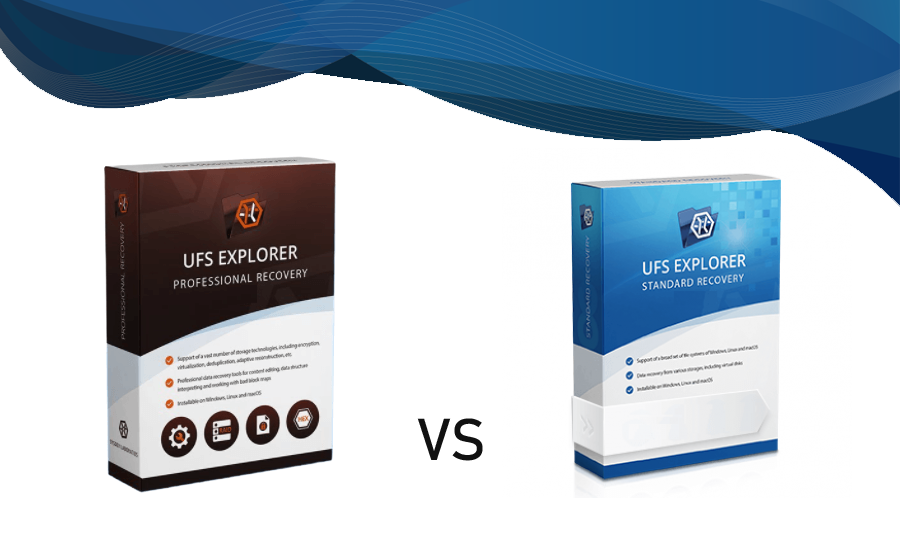
If you have accidentally deleted an important file from your computer or lost files due to a computer crash, you may be looking into data recovery options.
In these situations, data recovery software can be a lifesaver, and UFS Explorer data recovery products appear especially appealing due to their extensive feature set and ability to solve complex data loss problems.
However, as with all software applications, first impressions and marketing promises can be deceiving, so we decided to put the most capable UFS Explorer data recovery products, UFS Explorer Professional Recovery and UFS Explorer Standard Recovery, into the review to determine which is worth the relatively high price.
What is UFS Explorer Standard Recovery?
UFS Explorer Standard Recovery includes everything needed to effectively handle common cases of data loss, such as deleted files, formatted or corrupted storage, and others. In addition to basic physical devices, the application supports virtual drives from popular virtualization systems and spanned volumes created by Windows, Linux, and macOS (LDM, LVM, Disk Utility, etc.). The software employs analogous techniques to scan discs and restore their logical structure, ensuring that data recovery operations are as effective and safe as possible. Furthermore, the program includes a disc image and the same set of supplementary options as more advanced editions, including immediate access to the intact content of partitions, reconstruction of lost file systems, file preview, sorting, filtering, and others.
Standard Recovery Pricing
UFS Explorer Standard Recovery is an indispensable helper in routine data recovery tasks which costs $64.9. Click here to grab UFS Explorer Standard Recovery with discount coupon up to 50%.
What is UFS Explorer Professional Recovery?
UFS Explorer Professional Recovery is a high-quality software application designed for data recovery specialists. The software successfully combines the most advanced data recovery algorithms with a variety of instruments for comprehensive raw data analysis and editing.
The program enables the creation of RAID of various types and levels, including hybrid and custom RAID configurations, allowing for the recovery of files from complex storage systems such as NAS and other RAID-based devices, as well as common stand-alone digital media. The utility supports both software/hardware RAID and arrays made up of disc images or virtual discs.
UFS Explorer Professional Recovery includes a set of decryption techniques that enable data recovery from encrypted storage devices (full-disk encryption, LUKS, Apple File Vault, eCryptFS, etc.) Furthermore, a long list of supported virtual technologies enables the program to work with virtual discs from VMware, Hyper-V, Parallels, EnCase, Runtime files, Synology Sparse iSCSI, multi-level virtual storages, and other systems in addition to simple disc images.
Professional Recovery Pricing
UFS Explorer Professional Recovery From $629.95, full-featured data recovery software for complex tasks. New Customers can get up to 25% savings using UFS Explorer Recovery software coupon codes.
Differences between UFS Explorer Professional Recovery and Standard Recovery
| Professional Recovery | Standard Recovery |
| UFS Explorer Professional Recovery is a professional data recovery solution. | UFS Explorer Standard Recovery is a quick fix for gaining access to undamaged files that cannot be opened due to system incompatibility or the inability to run a virtual machine. |
| From $629.95 | From $64.95 |
| Features: | Features: |
Conclusion
Overall, UFS Explorer Professional Recovery and UFS Explorer Standard Recovery recover all test files successfully, and we are confident that they would handle more complex data recovery scenarios just as well. We just wish the tool was more user-friendly because navigating its wealth of advanced options can be difficult even for those with years of data recovery experience.
UFS Explorer Standard Recovery tool’s low cost and functionality make it an excellent substitute for UFS Explorer Professional Recovery in routine data recovery tasks.
FAQs
- What should I do if I ordered a license for the incorrect edition?
If you purchased a license for a software edition that lacks the functions you require, you can upgrade to a more advanced UFS Explorer product by paying the difference in license cost. Another option is to purchase a license for another product and request a refund for the previous license. Please contact UFS explorer for more information on the available options.
- What is the distinction between UFS Explorer’s “edition,” “version,” and “OS version”?
UFS Explorer’s edition is expressed in the product’s name and determines the set of features and functions available, for example, UFS Explorer Standard Recovery or UFS Explorer Professional Recovery. The version of UFS Explorer is the number assigned to the product to distribute upgrades and updates. Major software releases are identified by the number to the left of the decimal point, whereas minor software updates are identified by the number to the right of the decimal point, as in UFS Explorer RAID Recovery 8.1. The OS version of UFS Explorer is an executable file that allows the software to be installed on the corresponding operating system, for example, UFS Explorer Standard Recovery for Windows.
- Is UFS Explorer or Recovery Explorer required? What is the distinction?
For both novice and experienced home users, Recovery Explorer is an excellent alternative to UFS Explorer.
- Is UFS Explorer safe to use?
UFS Explorer is a data recovery solution that is “read-only.” The software neither writes to the processed storage medium nor attempts to repair any of its structures. If the device is free of physical flaws, its use is completely safe for the storage and retrieval of data. However, one cannot completely rule out the possibility of misusing the software or its specific functions, which could result in data overwriting. To avoid any negative consequences, please strictly follow the instructions provided in the software’s supplementary materials.
- How long will UFS Explorer take to scan my storage device?
Unfortunately, estimating the time required to complete the scan is difficult because it is determined by many external factors. These include the type of storage medium, the amount of data stored on it, the connection speed, and other factors.
